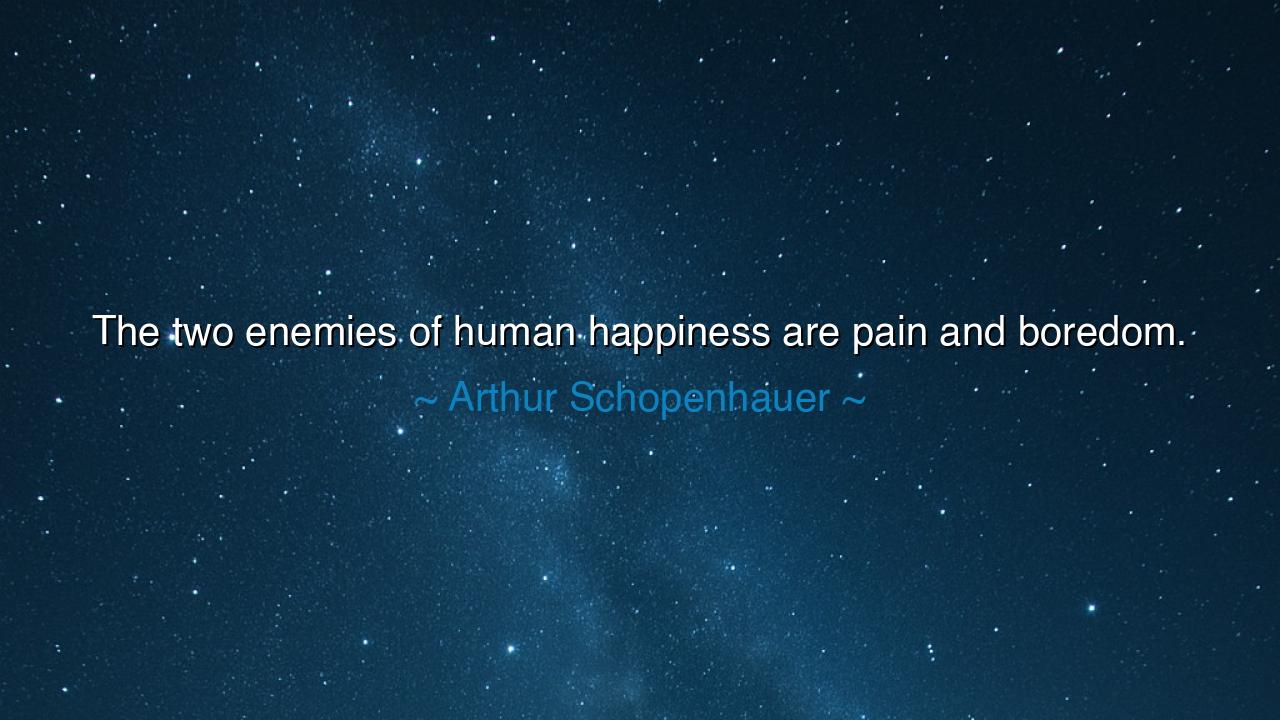
The two enemies of human happiness are pain and boredom.






In the piercing words of Arthur Schopenhauer, the philosopher of human desire and suffering, we find a truth that echoes through the corridors of time: “The two enemies of human happiness are pain and boredom.” In these few words, he reveals the twin adversaries that lie in wait for every soul, whether high-born or humble, learned or simple. Pain, the sharp and unrelenting force of suffering, gnaws at the body and the spirit alike; boredom, the insidious emptiness of the mind and heart, devours joy and leaves the soul hollow. Together, they form the perennial challenge of human life — a dual threat that must be acknowledged, endured, and transcended if one is to glimpse the elusive grace of happiness.
The origin of this observation lies in Schopenhauer’s deep study of the human condition, shaped by his understanding of desire, will, and the nature of suffering. Writing in the 19th century, he saw that men and women are driven ceaselessly by longing: for wealth, for power, for pleasure. Yet when desire is thwarted, pain arises, and when desire is satisfied, the mind soon lapses into boredom, for even fulfillment carries within it the seeds of emptiness. Happiness, Schopenhauer concluded, is not a permanent dwelling, but a fleeting respite between these twin torments, a fragile oasis in the desert of existence.
To grasp this truth, one must look beyond superficial pleasure to the deeper currents of life. Pain is the overt adversary: the grief of loss, the anguish of betrayal, the torment of the body. It is visible, immediate, and undeniable. Boredom, however, is the subtler enemy. It creeps into the heart when activity is shallow, when the soul finds no engagement in work, love, or contemplation. It is the quiet despair of idleness, the hollow ache of a life that does not stretch, a mind that does not reach beyond itself. Schopenhauer warns that both enemies are unavoidable, yet how one contends with them determines the measure of one’s happiness.
History provides many examples of those who have struggled against these twin adversaries. Consider Ludwig van Beethoven, whose music would shake the foundations of human emotion, yet who endured deafness, the loss of family, and chronic illness. His life was rife with pain, yet he combated boredom through intense focus on composition, immersion in his art, and relentless pursuit of beauty. In this synthesis, he found moments of transcendent joy — brief yet profound — revealing Schopenhauer’s truth: happiness is crafted, not granted, and it arises not in the absence of suffering, but in the courage to engage fully with life.
Even in more ordinary lives, the lesson resonates. A farmer rising with the sun, facing toil in the fields, endures pain in labor. Yet by tending his land, nurturing life, and witnessing growth, he combats boredom, transforming routine into purpose. The scholar poring over texts, wrestling with ideas, feels mental fatigue — yet the very engagement with thought shields against emptiness. Schopenhauer teaches that active engagement, whether of body, mind, or spirit, is the antidote to boredom, while resilience and acceptance are the weapons against pain.
The deeper insight of this philosophy is not mere resignation, but empowerment. By recognizing pain and boredom as the enemies, one is no longer a passive victim of circumstance. One cultivates practices and habits that foster resilience, curiosity, and engagement. Meditation, creative endeavor, intellectual exploration, and compassionate action all serve to soften the sting of suffering and the weight of monotony. In short, happiness is not the absence of adversity, but the skillful navigation of life’s inevitable hardships and voids.
Therefore, the lesson for all who walk this earth is clear: do not seek happiness in permanence, but in the active shaping of life. When pain strikes, face it with courage, learn from it, and let it temper your strength. When boredom threatens, fill the mind and heart with curiosity, purpose, and connection. Recognize that fleeting moments of joy, though temporary, are the true treasure, made precious by the contrast with suffering and emptiness.
So, my child, live not in denial of the twin enemies, but in mastery of them. Let pain teach you depth, and boredom teach you creativity. Engage fully with life’s trials and its silences, for therein lies the fragile yet enduring spark of happiness. Schopenhauer’s wisdom endures because it honors the human spirit: that even amid suffering and emptiness, one may carve a life rich in meaning, beauty, and fleeting, radiant joy.






AAdministratorAdministrator
Welcome, honored guests. Please leave a comment, we will respond soon